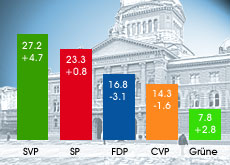
Triumphant rightwing wants Blocher in the cabinet

The rightwing Swiss People’s Party is poised to win the largest share of the vote in Sunday’s parliamentary elections, according to exit polls.
The party called initial results a “historic victory” and demanded an additional cabinet seat, putting forward a leading party figure, Christoph Blocher, as its candidate.
The People’s Party looks set to win an additional 12 seats in the 200-member House of Representatives, taking its total to 56. Exit polls show it won 27.2 per cent of the popular vote, up 4.7 per cent from 1999.
“We need a second [cabinet] seat and our second candidate would be Blocher,” Ueli Maurer, the president of the People’s Party, told Swiss television.
Such a move would change the so-called “Magic Formula”, a power-sharing arrangement that gives the Social Democrats, the Radicals and the Christian Democrats two seats each, and the People’s Party one.
“If Blocher is not elected we will withdraw our current [cabinet] minister, Samuel Schmid, and go completely in the opposition,” Maurer added.
Maurer’s view is shared by Hans Hofmann of the Swiss People’s Party in Zurich.
“We are prepared to fight and there is now a very real danger that if we don’t get this seat we will have no choice but to pull out of the cabinet and become a party of opposition,” Hofmann told swissinfo.
“That would be shame – but the other parties must be aware that the stakes are now high.”
Sunday’s vote looks set to confirm that the Rightwing is picking up most of the Centre-right’s disaffected voters: exit polls suggest that the Radicals and Christian Democrats will lose seven and eights seats respectively.
Biggest losers
The two Centre-right parties now have 35 and 27 seats respectively, according to the poll by the GfS institute on behalf of the Swiss Broadcasting Corporation.
Opinion polls had predicted a further hollowing out of the Centre in a trend that started at the last elections in 1999.
The left-leaning Social Democrats seem to be holding their ground with 52 seats up from 50.
The Social Democrats showed contentment over the party’s outcome in Sunday’s election.
“I am happy with our results but it worries me that the Swiss People’s Party has gained so many seats,” said the party’s president, Christiane Brunner.
Switzerland’s Green Party looks set to be one of the winners of this year’s elections, gaining five seats since the last elections in 1999.
French-speaking cantons
Early indications also suggest that the People’s Party has achieved its aim of appealing to voters outside German-speaking Switzerland.
It has increased its share in several French-speaking cantons and is poised to win two seats in the Centre-left stronghold of Geneva, which has a total of 11 seats in the House of Representatives.
“This looks great for Switzerland,” said Blocher.
Turnout
About 4.7 million Swiss were eligible to vote. They also cast their ballot in Senate elections in 22 of the 26 cantons.
The turnout was at 45.6 per cent.
Partial results in the Senate elections show the centre-left Social Democrats winning at least one additional seat.
In a major upset in canton Bern, Simonetta Sommaruga won a seat for the Social Democrats at the expense of the Radicals. Sommaruga, who has been a member of the House of Representatives, is also president of the country’s consumer organisation.
Run-off elections will have to take place in at least six cantons next month, because candidates did not receive an absolute majority.
The centre-right Christian Democrats and the Radicals remain the biggest parties in the Senate.
swissinfo
First exit polls give the People’s Party a 27.2 per cent share of the vote, the Social Democrats 23.3, Radicals, 16.8 and the Christian Democrats 14.3.
The People’s Party’s share of the vote has risen by nearly five per cent since the 1999 election.
Around 4.7 million people are eligible to vote in Switzerland.
Turnout was at 45.6 per cent.
Parliamentarians in the House of Representatives are elected by proportional representation.
The Senate is largely chosen by the first-past-the-post system.
The number of parliamentarians each canton sends to the 200-member House of Representatives depends on the size of the canton’s population.
This is not the case with Senate, where each canton sends two senators and each half canton sends one. There are 46 senators in total.

In compliance with the JTI standards
More: SWI swissinfo.ch certified by the Journalism Trust Initiative


























You can find an overview of ongoing debates with our journalists here . Please join us!
If you want to start a conversation about a topic raised in this article or want to report factual errors, email us at english@swissinfo.ch.